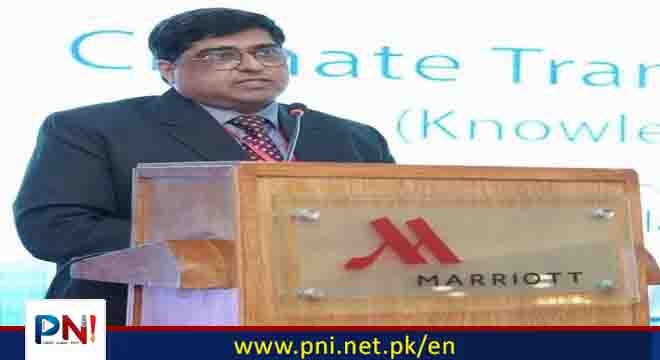Islamabad, 19th Sept 2023 (Online): A 3-day National Climate Transparency Forum started in Islamabad on Tuesday, continue till 21 September 2023.
The forum has been organized by Global Climate-Change Impact Studies Centre (GCISC), Ministry of Climate Change and Environmental Coordination (MoCC& EC) and CITEPA France with the financial support of GIZ Pakistan.
Three days’ workshop aims to get a detailed understanding of achievements and next steps of the transparency project, ensuring visibility of GCISC and GIZ, commitments to transparency/MRV, enabling engagement of stakeholders and promote interactions and synergy with other initiatives in the country at national / sectoral / local scales.
The 3-day forum also introduces the launch of Measurement, Reporting and Verification (MRV) for Mitigation and Adaptation tracking in Pakistan. In this context, a tool called as Climate Transparency Platform for Pakistan has been developed by the joint efforts of CITEPA France and GCISC.
Representatives of federal and provincial planning, Research, development, implementation, academia and civil society organizations are participating in the forum.
Arif Goheer appreciated the overwhelming response of provinces in climate transparency related activities and hoped that the data sharing on climate actionsis streamlined and continues to foster collaboration among all stakeholders involved in mitigating the effects of climate change.
The purpose of day 1 of training was to give brief overview of transparency platform called RISQ and to know how to link the platform with national communications like TNC, NDC, NAP etc. Moving on to Day 2, which focuses on the mitigation component of the RISQ tool with specific attention on the assessment of GHG impacts and tracking of mitigation actions, policies and measures.
The mitigation component aims at developing a framework for compiling GHG inventories, data collection, data sharing, data reporting and institutional arrangements, according to the UNFCCC guidelines and Paris Agreement.
As we transition to day 3, the emphasis shifts towards enhancing awareness on adaptation M&E systems (which is a relatively new concept) and, to get inputs from the key stakeholders for the development of M& E System for Adaptation Tracking in the Agriculture and water Sector.
Mr. Asif Sahibbzada stated that Pakistan despite being the 5th largest population in the world and a small contributor to global GHG emissions (less than 1%) is committed to reduce its GHG emissions. He further reiterated that building resilience to climate change is a key focus of national Climate Change Policy of Government of Pakistan and the government will ensure its cooperation with national and local agencies.
Mr. ArifGoheer (Head -GCISC) said that as per Paris Agreement, all countries are required to produce reliable, transparent and comprehensive information on GHG emissions, climate actions and support under the Enhanced Transparency Framework. He explained that the new international adopted framework will enable the implementation of mitigation, adaptation and support actions as well as their monitoring over time. This monitoring will be reported on a regular basis as part of the BTR (Biennial Transparency Report) which will replace the BUR (Biennial Updated report) by 2025.
In this context, the inventory of GHG emissions as well as the action monitoring indicators are essential for the monitoring and confidence of the international community. Hence the national GHG inventory project which aims at developing a framework for compiling the GHG inventories on regular basis is carried out at GCISC.
He further explained the importance of developing the adaptation tracking mechanism, which will not only aid in the national climate change adaptation planning process but also will support in preparing the Adaptation Communication (ADCOM) for UNFCCC. He highlighted the significance of climate change adaptation, stating that adaptation is a critical concern for developing countries and in particular for Pakistan owing to the fragility of its ecosystems and its vulnerability to the impacts of climate change.
Irfan Tariq renowned environmentalist and former DG environment decalred the official Launch of MRV platform as proud momnet. He emphasized that partnerships are very essential to make the transparency platform efficient and functional. IT system will enable Pakistan to track climate change actions, for transparent reporting for better coordination and communication with local and national agencies, he said.
Mr. Baptiste Chatre Head Climate Programme GIZ appreciated the active role of GCISC being a research arm of MOCC &EC in spearhidng the GHG and transparency activities in particular and climate in general. He mentioned that developed MRV framework will not only facilitate in international reporting but also will ensure the international financial support to Pakistan on climate change actions.
Speaking to the audience Ms. Ghislaine CITEPA France expert showed her pleasure on the pace of the project and emphasized the need for robust data for transparency actions.
The second day of the workshop will be focusing on MRV mitigation actions, policy and measures.
Follow the PNI Facebook page for the latest news and updates.








